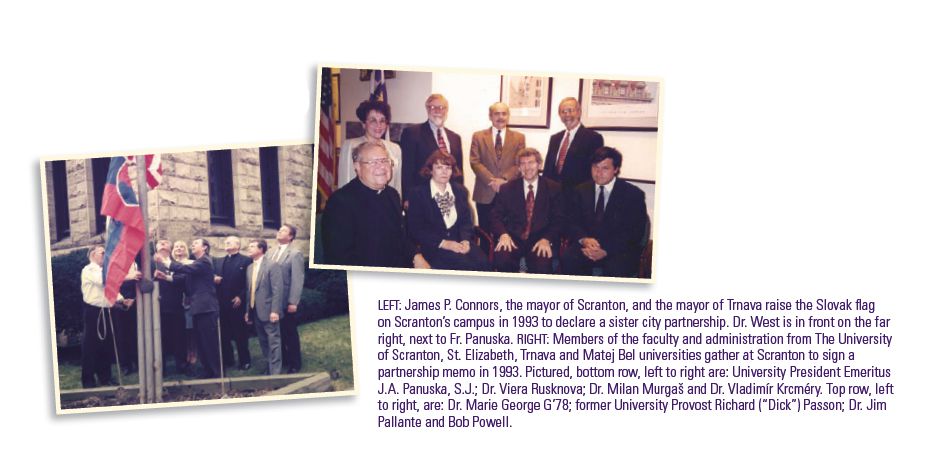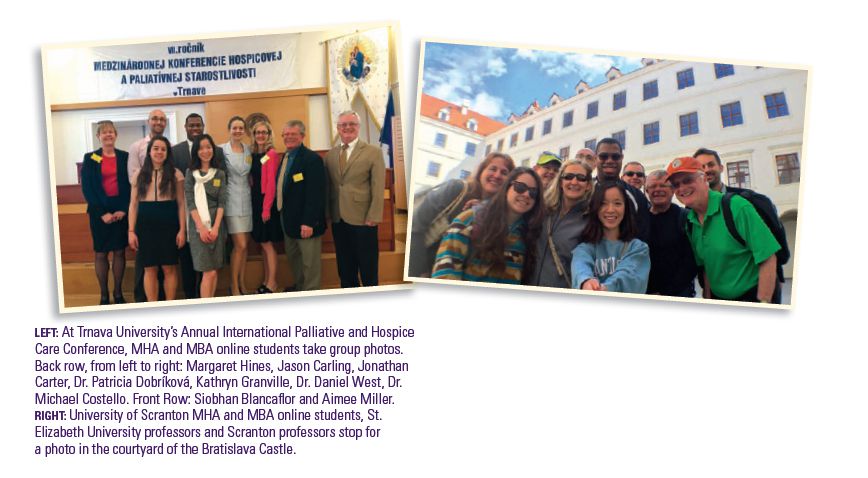Over the past two decades, it has become more and more apparent that the world is getting smaller. All the while, the faculty members who have been running the University’s Master of Health Administration (MHA) on-campus and online programs have been thinking globally, believing that students should contribute in a meaningful way to build a better, broader world. The best proof of this mindset is a study-abroad course in Slovakia.
Daniel West, Ph.D., professor and chair of the Department of Health and Human Resources, explained the inner workings of an ever-expanding program that is flourishing thanks, in part, to a 20-year relationship with St. Elizabeth and Trnava universities, two Catholic institutions in the heart of Slovakia. The partnership and course began when Dr. West applied for a grant from the United States Agency on International Development (USAID) on the heels of University President Emeritus J.A. Panuska, S.J.’s work in Czechoslovakia.
When Slovakia, Poland and eventually Ukraine, Hungary and other countries became independent of the Soviet Union in the early 1990s, USAID put out a call for grants because of its commitment to emerging democracies. At that time, Fr. Panuska had written a newsletter for faculty about his work in Czechoslovakia. Dr. West was “intrigued” and what resulted was, to Dr. West’s understanding, “the longest sustainable partnership USAID has ever had.”
“Twenty years later, it’s still going on,” he said. “It’s really a partnership that has transcended time in a very positive way.”
Course and Outcomes
The grant and connection with St. Elizabeth and Trnava in Slovakia have allowed master’s level students — eight to 10 students per trip — enrolled in the Global Health Management course to travel each January and May to experience the type of immersive education typically only available to undergraduates.
The course has all the rigor of an academic course, according to several students in the program, plus it offers a host of other opportunities unavailable in a Scranton classroom. Traveling students and faculty, for example, regularly present research at an international conference on a health care topic. They also lecture alongside international Ph.D. students and interact with other international graduate students.
Aimee Miller ’12, a University neuroscience and pre-med graduate who expects to finish her MHA in 2016, took the course and traveled to Slovakia in May. The actual trip, she said, seemed short, time-wise, but in regard to preparation, it took an entire semester. “We have textbooks based on Slovakia’s health system and global health,” she said, explaining that students tailor their work for the conference according to their own interests. Her interest is pediatrics, so she presented research on this topic at a palliative-care conference.
During their trip, students also visit Hungary, Austria and the Czech Republic, spending time with local and international students, health care executives, touring hospitals and facilities, networking and preparing research papers for presentation at international academic forums at the close of the trip. Many student travelers also sought the opportunity to publish their papers in international peer-reviewed journals, such as the European Journal of Public Health and Health Management.
A New Perspective
Although this is just one course among many in the MHA program, the experiential learning aspect has a lasting impact on students, faculty and alumni.
Atty. Sal Savatteri Jr. G’96 took the course while pursuing his MHA. Now an immigration lawyer in Portland, Maine, he founded the globally minded Savatteri Law Firm in 2006. The University’s MHA study-abroad program “was really instrumental in my life and in creating my practice in international law,” he said. “All of the work that I have done has really grown from that one program. My whole practice is international.”
Hearing alumni and students talk about how this experience changed their lives is nothing new to Steven Szydlowski, DHA, G’01, MHA program director. A current student who went to Slovakia said it gave her a new perspective, not just on health care, but on life.
“The course helps our students become more well-rounded,” said Dr. Szydlowski. “Touring hospitals while abroad helps Scranton students more deeply understand global health issues that are both universally and locally specific. This helps them to understand the needs of diverse cultures and populations and appreciate the similarities and differences among them.”
Dr. Szydlowski met the MHA program director from St. Elizabeth in Slovakia in 1998. “Seventeen years later, we’re still doing research together and teaching together,” he said.
Perhaps it’s the intensity of a 10-day trip or the beautiful scenery, but personal and professional partnerships that began on this trip last far beyond graduation. In fact, three students who crossed the Atlantic for this course found their husband or wife in Slovakia.
Miller said the professional experience she gained in Slovakia was invaluable, but what she did not expect was to form such close friendships in such a short time period. She befriended two physicians who later visited her in Scranton. “It’s really from talking with them that I learn about their health care system, and about so much else, from social issues to politics in their country.”
Miller is now publishing with some of the physicians she met in Slovakia, and she said that her experiences taking courses abroad has changed her. “Once you gain that global perspective,” she said, “you can never go back.”
Expanding and Replicating
As much as this course benefits Scranton and its students, it has also had a positive influence for universities in Slovakia. Scranton helped develop an MHA program at St. Elizabeth University, which also hosts traveling Scranton students in its capital location, and worked with Trnava University, which went underground during the Communist era, to reinvent its Jesuit identity.
In addition to academic curricula, Scranton has had a hand in taking its mission values on the road through this partnership. The partner universities have developed volunteer programs in developing countries such as Sudan, Cambodia, Rwanda and Uganda.
“When you meet people in other countries and develop trust in working with them and they know you care about their country and culture, then many new doors open,” said Dr. West.
The original partnership has been so successful and replicable, said Dr. West, that it has spurred expansion from Eastern and Central Europe into the Middle East and other parts of Asia as well as Africa and South Africa. The study-abroad program also now offers a South American trip to Brazil as part of one of the University’s newest international relationships, with Pontifical Catholic University of Rio de Janeiro (PUC-Rio). Similar efforts also have begun in Tbilisi, Georgia — in the Caucasus region that forms the continental divide between Asia and Europe — in Mexico and in Bogota, Colombia. There are 52 projects worldwide, from Vietnam to Sudan.
“I think it’s important when The University of Scranton goes out and engages the world that the project is sustainable,” said Dr. West. “The fastest-growing part of our University is in the graduate curriculum. We need to think about how we expose all of our students to study abroad, and this really has grown into a very nice model that can continue to be developed.”



